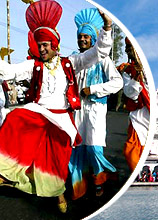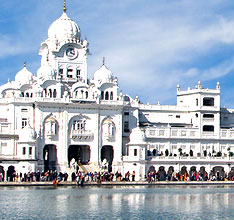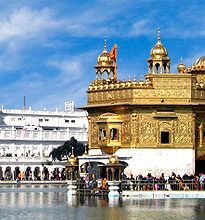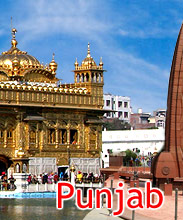 Time: 13th April
Time: 13th AprilVenue: All over Punjab
Significance: Harvest Festival
Highlights: Prayers in Gurdwara, Performance of bhangra and gidda
Baisakhi marks the beginning of "New Year "in Punjab. It is celebrated to commemorate the ripening of winter (rabi) harvest and in turn, honor the hard work of farmers. It is observed on 13th of April every year and marks the time of festivities and gaiety among the inhabitants of Punjab. Baisakhi is celebrated to show gratitude to The Almighty, for blessing them with a bountiful harvest. On this day, people take bath before the dawn and visit gurdwara to offer their prayer. Kirtans and recital of passages from the Granth Sahib take place in the gurdwaras. There is the distribution of the delicious kada Prasad, followed by kar sewa. On the day of Baisakhi, Sun enters Aries, the first sign of Zodiac.
Significance
The festival of Baisakhi has a religious connotation attached to it. On the same date in the year 1699, the tenth Sikh Guru, Guru Gobind Singh, founded the Khalsa (the pure ones) and baptized the first Sikhs using sweet nectar called "Amrit”. Khalsa symbolized the dawn of clear identity on the Punjabis. They were given a code of conduct to live by. The distinction between rich and poor was eliminated and equality was proclaimed. So, Baisakhi recalls the great values preached and practiced by the Gurus. Every year, on this day, the holy book of the Sikhs 'Guru Granth Sahib’ is taken in a procession led by the 'Panj Pyaras’ (five senior Sikhs), who are symbolic of the original leaders.
Celebration
Baisakhi is celebrated with great pomp and show in Punjab. Punjabis, by nature, are merry-making people who love to dance and make merry at any and every occasion. The festival gives them a great chance for celebration. A major attraction of the festival is the dynamic bhangra and gidda performances by men and women, respectively. Dancers perform to the fast beat of drums, enacting the routine scene of sowing, harvesting, winnowing and gathering of crops. Cries of "Jatta aai Baisakhi” fill the sky of Punjab. On this day, people teach their children acts of charity and ask them to behold them forever. They dress colorfully in the traditional dresses, with men wearing lungi, kurta and pagri, while the women are clad in attractive salwar kameez & jewelry.
As is usual with any other Indian festival, the house and surroundings are cleaned on the day before Baisakhi as well. The festival provides an occasion for friends and relatives to meet each other. Delicious Punjabi dishes, both vegetarian and non-vegetarian, are prepared and shared. Sweets (mithai) and lassi (curd beaten with water and sugar) are the main delicacies of the day. Many fairs are also held during Baisakhi, which invite a lot of tourists. There is a wide display of traditional items as well as household goods, in the fairs. Also, there are number of food stalls offering mouth-watering delicacies like chaat (a spicy concoction), flossy sugar lollipops, ice-creams etc. Baisakhi brings with it the note of fulfillment and happiness. It works as a unifying factor, binding the people of the Punjab irrespective of their caste, creed or sex. It is, indeed, the manifestation of true Punjabi spirit.











